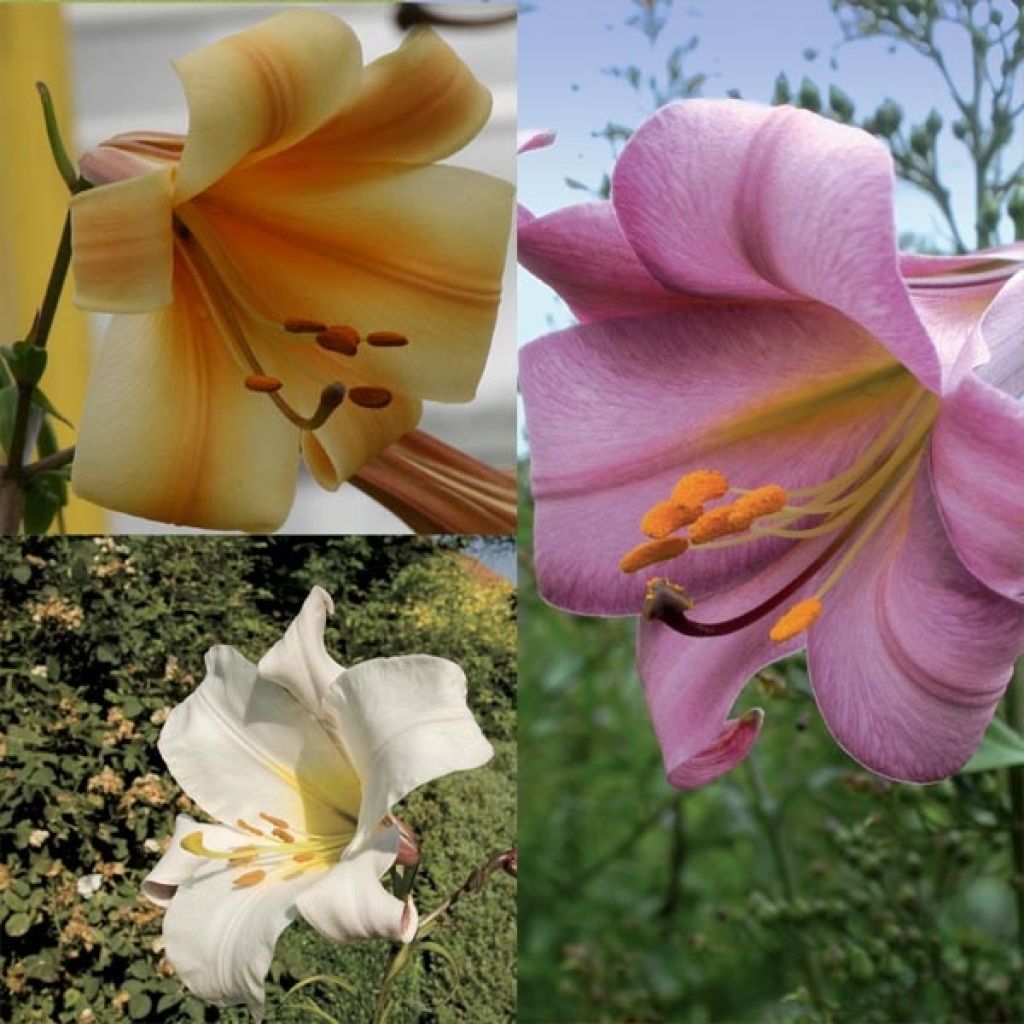

Collection of Trumpet Lilies
Collection of Trumpet Lilies
Lilium regale botanique, Pink Perfection, African Queen
The received bulbs appear to be healthy, planted, I am awaiting their development...
Thierry, 01/06/2019
This plant carries a 6 months recovery warranty
More information
We guarantee the quality of our plants for a full growing cycle, and will replace at our expense any plant that fails to recover under normal climatic and planting conditions.
From €5.90 for pickup delivery and €6.90 for home delivery
Express home delivery from €8.90.
Does this plant fit my garden?
Set up your Plantfit profile →
Collection items (9 plants)
Description
We offer you a collection of stunning Trumpet Lilies, which are among the most fragrant and the easiest to grow: the botanical Royal Lily, Lilium regale, along with its varieties 'Pink Perfection', with flowers in a pretty pale pink, and 'African Queen', whose corollas sport a warm orange gradient. All these lilies are reliable varieties that faithfully bloom each year and establish themselves in the garden. Plant them in a bed or even in a large rockery. Their flowers are absolutely fabulous in a bouquet!
This collection consists of:
3 Pink Perfection Lilies, which grow on strong stems of 1.20 m (4ft) with an impressive floral crown composed of large fragrant trumpets, in a delicate pink, a little lilac, not too bright, not too pale.
3 African Queen Lilies, of the same height, with corollas offering a beautiful orange gradient that ranges from dark yellow to apricot.
3 Royal Lilies, indestructible, that can exceed 1.50 m (5ft) in height. Its large white flowers with a purple underside exhale an absolutely sumptuous fragrance.
The plants are labeled separately.
Lilies belong to the Liliaceae family. The Royal Lily, Lilium regale, is native to western Sichuan, China, and was introduced to England in 1903. It is a tall bulbous plant that has produced horticultural varieties through hybridization with other species, classified in the Trumpet Lily group. These lilies have generally inherited the robustness of their parent, and prove particularly easy to grow in any well-drained soil that doesn't retain excess water.
Trumpet lilies bloom from June to August, depending on the climate. Each stem bears up to 25 fragrant flowers arranged in umbels, grouped in 3 to 5. The flowers have a funnel shape 14 cm (6in) long, and are strongly scented, especially in the late afternoon and at night. The foliage is linear and dark green, with leaves scattered along the stem, which withstands the wind well. The growth of lilies starts quite late in spring and their vegetation disappears in autumn. The bulbs have an ovoid shape, are reddish, and formed of thick, oval, firmly imbricate scales.
You can combine these lilies with perennial plants or bushes like roses, as they appreciate having their base in the shade, and these plants will help prevent the stems from bending under the effect of bad weather. Their association with ornamental grasses or bronze fennel is at once very modern and very pleasantly rustic. Lilies are ideal in beds, borders or large pots, and of course in bouquets.
Report an error about the product description
Plant habit
Flowering
Foliage
Botanical data
Lilium
regale
botanique, Pink Perfection, African Queen
Liliaceae
Cultivar or hybrid
Other Easter Lilies (Longiflorum Lilies)
Planting and care
Lilies will be available in early October. Plant them as soon as you receive them. They thrive in the winter cold, which allows them to take root. Dig deep planting holes and mix garden soil with compost. The bulbs should be buried under 10cm (4in) of soil. They tolerate all exposures but dislike excess moisture so give them a well-drained soil.
Our tip: Lilies are very suitable for pot cultivation: Place 1 to 5 bulbs in a deep pot, water a little and keep the pots frost-free. Take them out in spring and enjoy their fragrance on your terrace!
Planting period
Intended location
Care
-
, onOrder confirmed
Reply from on Promesse de fleurs
Haven't found what you were looking for?
Hardiness is the lowest winter temperature a plant can endure without suffering serious damage or even dying. However, hardiness is affected by location (a sheltered area, such as a patio), protection (winter cover) and soil type (hardiness is improved by well-drained soil).

Photo Sharing Terms & Conditions
In order to encourage gardeners to interact and share their experiences, Promesse de fleurs offers various media enabling content to be uploaded onto its Site - in particular via the ‘Photo sharing’ module.
The User agrees to refrain from:
- Posting any content that is illegal, prejudicial, insulting, racist, inciteful to hatred, revisionist, contrary to public decency, that infringes on privacy or on the privacy rights of third parties, in particular the publicity rights of persons and goods, intellectual property rights, or the right to privacy.
- Submitting content on behalf of a third party;
- Impersonate the identity of a third party and/or publish any personal information about a third party;
In general, the User undertakes to refrain from any unethical behaviour.
All Content (in particular text, comments, files, images, photos, videos, creative works, etc.), which may be subject to property or intellectual property rights, image or other private rights, shall remain the property of the User, subject to the limited rights granted by the terms of the licence granted by Promesse de fleurs as stated below. Users are at liberty to publish or not to publish such Content on the Site, notably via the ‘Photo Sharing’ facility, and accept that this Content shall be made public and freely accessible, notably on the Internet.
Users further acknowledge, undertake to have ,and guarantee that they hold all necessary rights and permissions to publish such material on the Site, in particular with regard to the legislation in force pertaining to any privacy, property, intellectual property, image, or contractual rights, or rights of any other nature. By publishing such Content on the Site, Users acknowledge accepting full liability as publishers of the Content within the meaning of the law, and grant Promesse de fleurs, free of charge, an inclusive, worldwide licence for the said Content for the entire duration of its publication, including all reproduction, representation, up/downloading, displaying, performing, transmission, and storage rights.
Users also grant permission for their name to be linked to the Content and accept that this link may not always be made available.
By engaging in posting material, Users consent to their Content becoming automatically accessible on the Internet, in particular on other sites and/or blogs and/or web pages of the Promesse de fleurs site, including in particular social pages and the Promesse de fleurs catalogue.
Users may secure the removal of entrusted content free of charge by issuing a simple request via our contact form.
The flowering period indicated on our website applies to countries and regions located in USDA zone 8 (France, the United Kingdom, Ireland, the Netherlands, etc.)
It will vary according to where you live:
- In zones 9 to 10 (Italy, Spain, Greece, etc.), flowering will occur about 2 to 4 weeks earlier.
- In zones 6 to 7 (Germany, Poland, Slovenia, and lower mountainous regions), flowering will be delayed by 2 to 3 weeks.
- In zone 5 (Central Europe, Scandinavia), blooming will be delayed by 3 to 5 weeks.
In temperate climates, pruning of spring-flowering shrubs (forsythia, spireas, etc.) should be done just after flowering.
Pruning of summer-flowering shrubs (Indian Lilac, Perovskia, etc.) can be done in winter or spring.
In cold regions as well as with frost-sensitive plants, avoid pruning too early when severe frosts may still occur.
The planting period indicated on our website applies to countries and regions located in USDA zone 8 (France, United Kingdom, Ireland, Netherlands).
It will vary according to where you live:
- In Mediterranean zones (Marseille, Madrid, Milan, etc.), autumn and winter are the best planting periods.
- In continental zones (Strasbourg, Munich, Vienna, etc.), delay planting by 2 to 3 weeks in spring and bring it forward by 2 to 4 weeks in autumn.
- In mountainous regions (the Alps, Pyrenees, Carpathians, etc.), it is best to plant in late spring (May-June) or late summer (August-September).
The harvesting period indicated on our website applies to countries and regions in USDA zone 8 (France, England, Ireland, the Netherlands).
In colder areas (Scandinavia, Poland, Austria...) fruit and vegetable harvests are likely to be delayed by 3-4 weeks.
In warmer areas (Italy, Spain, Greece, etc.), harvesting will probably take place earlier, depending on weather conditions.
The sowing periods indicated on our website apply to countries and regions within USDA Zone 8 (France, UK, Ireland, Netherlands).
In colder areas (Scandinavia, Poland, Austria...), delay any outdoor sowing by 3-4 weeks, or sow under glass.
In warmer climes (Italy, Spain, Greece, etc.), bring outdoor sowing forward by a few weeks.







































